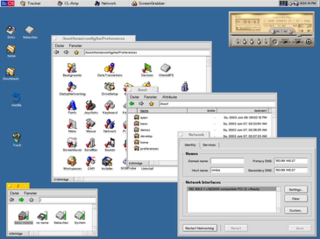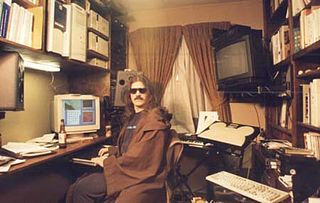
Amiga is a family of personal computers produced by Commodore from 1985 until 1994, with production by others for a number of years afterwards. The original model is one of a number of mid-1980s computers with 16- or 16/32-bit processors, 256 KB or more of RAM, mouse-based GUIs, and significantly improved graphics and audio compared to previous 8-bit systems. These systems include the Atari ST—released earlier the same year—as well as the Macintosh and Acorn Archimedes. Based on the Motorola 68000 microprocessor, the Amiga differs from its contemporaries through the inclusion of custom hardware to accelerate graphics and sound, including sprites and a blitter, and a pre-emptive multitasking operating system called AmigaOS.

BeOS is a discontinued operating system for personal computers that was developed by Be Inc. It was conceived for the company's BeBox personal computer which was released in 1995. BeOS was designed for multitasking, multithreading, and a graphical user interface. The OS was later sold to OEMs, retail, and directly to users; its last version was released as freeware.
Commodore International Corporation was a home computer and electronics manufacturer incorporated in The Bahamas with executive offices in the United States founded in 1976 by Jack Tramiel and Irving Gould. Commodore International (CI), along with its subsidiary Commodore Business Machines (CBM), was a significant participant in the development of the home computer industry, and at one point in the 1980s was the world's largest in the industry.
Amiga E is a programming language created by Wouter van Oortmerssen on the Amiga computer. The work on the language started in 1991 and was first released in 1993. The original incarnation of Amiga E was being developed until 1997, when the popularity of the Amiga platform dropped significantly after the bankruptcy of Amiga intellectual property owner Escom AG.

Be Inc. was an American computer company that created and developed the BeOS and BeIA operating systems, and the BeBox personal computer. It was founded in 1990 by former Apple Computer executive Jean-Louis Gassée, who also served as the company's CEO, and was based in Menlo Park, California.

Gateway, Inc., previously Gateway 2000, Inc., was an American computer company originally based in Iowa and South Dakota. Founded by Ted Waitt and Mike Hammond in 1985, the company developed, manufactured, supported, and marketed a wide range of personal computers, computer monitors, servers, and computer accessories. At its peak in the year 2000, the company employed nearly 25,000 worldwide. Following a seven-year-long slump, punctuated by the acquisition of rival computer manufacturer eMachines in 2004 and massive consolidation of the company's various divisions in an attempt to curb losses and regain market share, Gateway was acquired by Taiwanese hardware and electronics corporation Acer in October 2007 for US$710 million.

Hyperion Entertainment CVBA is a Belgian software company which in its early years focused in porting Windows games to Amiga OS, Linux, and Mac OS. In 2001, they accepted a contract by Amiga Incorporated to develop AmigaOS 4 and mainly discontinued their porting business to pursue this development. AmigaOS 4 runs on the AmigaOne systems, Commodore Amiga systems with a Phase5 PowerUP accelerator board, Pegasos II systems and Sam440/Sam460 systems.

Escom AG was a German computer company, best known in Germany, the Netherlands, United Kingdom and the United States as the successful purchaser of Commodore International and the Amiga trademarks in 1995.

Dave Haynie is an American electrical engineer and was chief engineer at Commodore International. He is vocal in the Amiga community.
Amiga, Inc. was a company run by Bill McEwen that used to hold some trademarks and other assets associated with the Amiga personal computer. The company has its origins in South Dakota–based Amiga, Inc., a subsidiary of Gateway 2000, of which McEwen was its marketing chief. Gateway 2000 sold the Amiga properties to McEwen's company Amino Development on December 31, 1999, which he later renamed to Amiga, Inc. The company sold the Amiga properties to Mike Battilana on February 1, 2019, under a new entity called Amiga Corporation.
Amiga is the name of a series of personal computers.
This is a list of models and clones of Amiga computers.
The Amiga is a family of home computers that were designed and sold by the Amiga Corporation from 1985 to 1994.

The Amiga 1200, or A1200, is a personal computer in the Amiga computer family released by Commodore International, aimed at the home computer market. It was launched on October 21, 1992, at a base price of £399 in the United Kingdom and $599 in the United States.

The Amiga Walker, sometimes incorrectly known as the Mind Walker, is a prototype of an Amiga computer developed and shown by Amiga Technologies, a subsidiary of Escom, in late 1995/early 1996. Walker was planned as a replacement for the A1200 with a faster CPU, better expansion capabilities, and a built-in CD-ROM. The Walker was never released; Escom and Amiga Technologies went bankrupt, and only two (three) prototypes were made.
The following history of the AmigaOS 4 dispute documents the legal battle mainly between the companies Amiga, Inc. and Hyperion Entertainment over the operating system AmigaOS 4. On 30 September 2009, Hyperion and Amiga, Inc. reached a settlement agreement where Hyperion was granted an exclusive, perpetual and worldwide right to distribute and use 'The Software', a term used during the dispute and subsequent settlement to refer to source code from AmigaOS 3 and earlier, and ownership of AmigaOS 4.x and beyond.

PowerUP boards were dual-processor accelerator boards designed by Phase5 Digital Products for Amiga computers. They had two different processors, a Motorola 68000 series (68k) and a PowerPC, working in parallel, sharing the complete address space of the Amiga computer system.

Petro Taras Ostap Tyschtschenko is a German businessman best known for his work in the European market for the American computer company Commodore International.

World of Commodore is an annual computer expo dedicated to Commodore computers.
3D Microcomputers Wholesale and Distribution, Inc., often referred to as 3D Microcomputers or 3D Micro, was a computer company based in Markham, Ontario. The company was among the top five personal computer vendors in Canada in the mid-1990s. The company was partially owned by Hong Kong–based computer manufacturer PC Chips for several years; many of the parts for 3D Micro's computers were of overseas origin.













